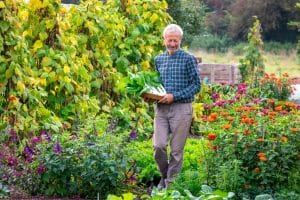It’s amazing the calm that can descend when you are surrounded by greenery.

All those problems suddenly seem manageable and your brain quietens right down. And actually putting your hands in the soil, can be life-changing.
According to mental health charity Mind, more than 7 million Brits say that since the pandemic their mental health has benefited from taking up gardening, while nearly two-thirds say gardening and nature help slash their stress levels.
It’s no surprise to Sarah Bowers, Birmingham regional centre manager at Thrive, a charity that uses social and therapeutic horticulture to help people in need.
“People’s appreciation of gardening and access to green space has gone through the roof,” she says.
You can see why. “The effect of being personally invested in growing something is phenomenal,” says Sarah. “You experience a sense of achievement, responsibility, the joy of watching a seed germinate, knowing you’ve cared for that plant. And then, all being well, you’re able to harvest it a few months later.”
But there are many other health benefits lying just underneath the soil. Ready, steady, dig!
Mental health benefits
Struggling to get out of bed or lacking motivation?
“Regular gardening can bring purpose and structure. Attending a community gardening programme or working on an allotment or just caring for something at home can give you that routine you need to get up in the morning,” explains Sarah.
“Being able to say: ‘I’m going to achieve something today,’ is a reason people enjoy gardening.” And that’s whether you have outdoor space or not. “That sense of achievement is still there even indoors,” says Sarah.
Mind’s research backs this up – 43% of people said looking after houseplants or window boxes boosted their wellbeing. Sarah recommends spider plants for indoor growing.
“It’s an easy plant to care for and they self-propagate. If you support it, before long, you can start planting on its baby spider plants and then share them with family and friends.”
She adds: “Gardening can also build confidence and self-esteem. We’ve had people who have been unemployed for 20 years, and after coming to one of our gardening programmes, have gone back into work. It’s amazing. It can help them realise their potential.’”
Cutting isolation
Social interaction with fellow green-fingered people is one of the main joys of gardening, says Sarah, especially if you volunteer at a community garden. “Sharing experiences with like-minded people and having that sense of something in common improves wellbeing and confidence.”
It could also help reduce loneliness – which can increase your risk of death by 26% and is linked to conditions including heart disease, obesity, depression and Alzheimer’s disease.
Stress-busting
Nature has the ability to make your cares fade away – and there is a scientific reason behind it. “Researchers have found that even looking at images of plants can help you feel better on a psychological level,” says Sarah.
“Biophilia is where connecting to nature can help us regain clarity, empathy, hope, composure, calmness and appreciation of life.” So if you’re stuck indoors or flagging at work, pull up an image of a tree for a quick, feel-good hit.
Improving mood
Gardening counts as exercise, which is a sure-fire way to release endorphins – happy hormones. Doctors are increasingly trying to harness the mood-boosting benefits of the great outdoors via “green social prescribing”.
Instead of just prescribing pills and talking therapies for mental health conditions, many GPs are now also referring people to grow-your-own schemes and community gardening projects.
Physical health benefits
The gardening world may have discovered the ultimate form of
wo
Physical health benefits
The gardening world may have discovered the ultimate form of working out, the kind where you don’t even know you’re
exercising.
“Mow the lawn, fill the watering can, move pots, scatter compost – before you know it, you’ve done two hours of continuous exercise,” says Sarah. Your garden can basically become a home gym! And it’s accessible regardless of ability or mobility.
“Even light table-top gardening (sowing seeds, watering, harvesting seeds) while sitting down will help keep upper-body muscle groups active,” explains Sarah. And thanks to all that fresh air and gentle exercise, it’s likely you’ll sleep more soundly, too.
Fine tuning
If your hands aren’t as nimble as they used to be or you’ve experienced a brain injury, gardening can help hone dexterity. “Some small, detailed activities, such as picking up a tiny seed, can help redevelop manual dexterity skills, and strengthen hands and fingers, as well as improve hand-eye coordination,” says Sarah.
Nutritional value
Eating home-grown produce adds to your five-a-day, increases your vitamin and fibre intake and will be tastier than the plastic-wrapped alternative from the supermarket.
“There’s nothing better than eating a tomato you’ve grown, or snipping off some herbs that you’ve cultivated yourself in a window box to add to your dinner,” says Sarah.
No garden? no problem
“Anybody can garden,” says Sarah. “You just need a bit of soil.” A windowsill or balcony can be just as effective as a garden.
You don’t need to buy seeds or plants – harvest seeds from a shop-bought chilli or tomato. Instead of buying plant pots, use cut-off bottles or yoghurt pots. And instead of a watering can, use an old plastic milk bottle with holes punched in the lid.
Visit Thrive.org.uk for more green-fingered tips.
(Article source: The Sun)

